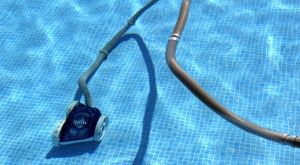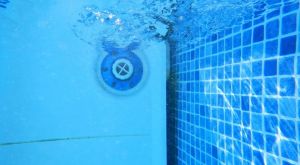A pool can turn into an of oasis in the harsh Australian summertime. Its blue water and relaxing aura can be the antidote to the otherwise dreadful southern-hemisphere heat. But unlike an oasis, pools require meticulous cleaning and attention. So what’s required in purchasing a top-quality pool cleaner that caters to your every need? Find out with this Canstar Blue article.
What is a pool cleaner?
A pool cleaner is a piece of machinery that acts as a vacuum to clean up debris in a pool, requiring little to no intervention from you. While you can always opt for the manual pool shovel to rid the pool of surface debris, an automated pool cleaner will give your pool a more thorough clean along the floor and the walls of the pool, allowing for a cleaner, and ultimately safer, pool.
Types of pool cleaners

Pool cleaners are divided into three categories that operate in different modes. These include:
- Suction pool cleaners
- Robotic pool cleaners
- Pressure pool cleaners
Suction pool cleaners
The suction cleaner uses your pool’s filtration box to clean debris. This is the most common form of pool cleaner, as it’s cheaper than other cleaners, and incredibly easy to install. However, a pool net may still be required to clean the surface of the pool, as the suction cleaner doesn’t reach the top.
Robotic pool cleaners
Robotic cleaners are much more expensive than suction cleaners, however they tend to have less blockages, and can cover much larger pools. They run electrically, so a power point near your pool is a must-have. Robotic cleaners are also much heavier than the suction cleaners, which can make placing them in the pool a hassle, and something worth considering before you buy.
Pressure pool cleaners
The pressure cleaner is a more powerful version of the suction cleaner. It still requires a cable which connects to the pool’s filtration system, and requires more maintenance than the suction cleaner. However, the pressure cleaner is able to reach tight corners and picks up finer debris at a faster rate, meaning that you get a cleaner pool as a result.
What to consider when buying a pool cleaner

There are a variety of factors to consider when buying a pool cleaner, including:
- Your pool: The size and shape of your pool will be a factor as to how effectively your pool cleaner may actually clean it, as well as what type of cleaner you need. Smaller pools may benefit from a simple suction cleaner, while larger pools may need a robotic model to get the job done.
- Surrounding debris: How dirty your pool gets, particularly from falling leaves and other pollutants from nearby trees and plants, will determine what pool cleaner you need, with the more trees you have nearby, the more cleaning your pool will need, and the more effective cleaner you’ll need to keep up with the job. Alternatively, you can also opt for a pool cover to help keep your pool free from falling debris.
- Pool filtration system: If your pool already has an effective filtration system, you may not have to go all out on a cleaner to keep your pool sparkly clean. However, if your filtration system isn’t working properly, your pool cleaner may need to work harder to compensate, meaning it’s important to keep the filtration system well-maintained.
- Nearby power: Whether there is a power socket close to your pool will also determine what type of pool cleaner you can get, as some pool cleaners need an external power supply.
- Your budget: As with any purchase, ensuring you get something within your means, and is good value, can often be the deciding factor. After all, you don’t want something that doesn’t get the job done, but you also don’t want to spend outside your means.
How much do pool cleaners cost?
Pool cleaners can vary in cost due to the variety of types and brands, but generally cost between $200 to over $2,000. Which retailer you also purchase through will also impact the price tag, meaning it’s best to look around at all your options before buying.
Where can you buy a pool cleaner?
Pool cleaners can be purchased at any pool specialty store, with some department stores stocking a selection of pool cleaners, in addition to some online retailers such as Amazon. You can also generally purchase directly through the brand itself, although this varies between brands.
How much electricity do pool cleaners use?
Fortunately, suction pool cleaners won’t add to your energy bill, as they hijack the energy that powers your pool’s filtration system. However robotic pool cleaners use a separate power source, meaning they use a separate allocation of electricity. They use roughly 100kWh per year on average, meaning that while it may not seem like much, it could be adding to your energy bill, particularly if you haven’t compared providers in a while.
Pool cleaner brands
There are a number of brands that offer pool cleaners, with the major players in the market including Zodiac, Dolphin and Hayward. Zodiac features the largest range of suction, robotic, and pressure cleaners, while Dolphin and Hayward tend to have products at the more expensive side of the scale. If you’re looking for the most popular models of pool cleaners, these three brands will get you there, however some other alternatives include:
- Pentair
- AstralPool
- Hayward
- Polaris
- Filtrite
- Aquabuddy
Are pool cleaners worth buying?
Ultimately, a pool cleaner is a must-have for the modern pool owner. Manually fishing out debris can be a losing battle, particularly if you have plenty of trees surrounding your pool. Fortunately, the range of pool cleaners available cater to a wide variety of pool types and owners, allowing you to find something that will help take care of your pool’s health without sinking your budget.
Of course, the value of your desired pool cleaner is completely dependent on your pool’s needs, its immediate environment, as well as the money you’re willing to dish out. As the Australian heat draws closer, keeping your pool crystal clear is an absolute necessity, and may be well worth shelling out for, particularly as you may find yourself wishing you were in your pool, rather than cleaning it.
Other articles you may be interested in
Picture credit: bignai/shutterstock.com, Josep Curto/shutterstock.com, hydra viridis/shutterstock.com


Share this article